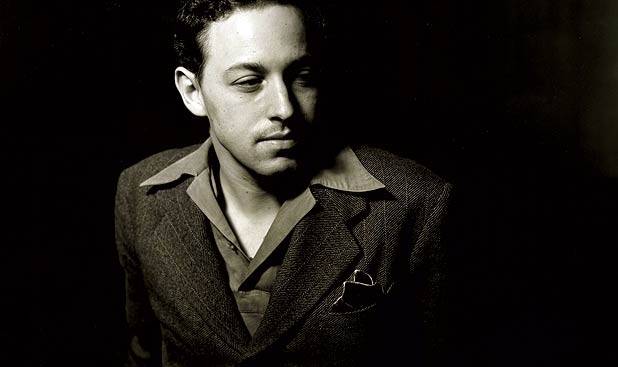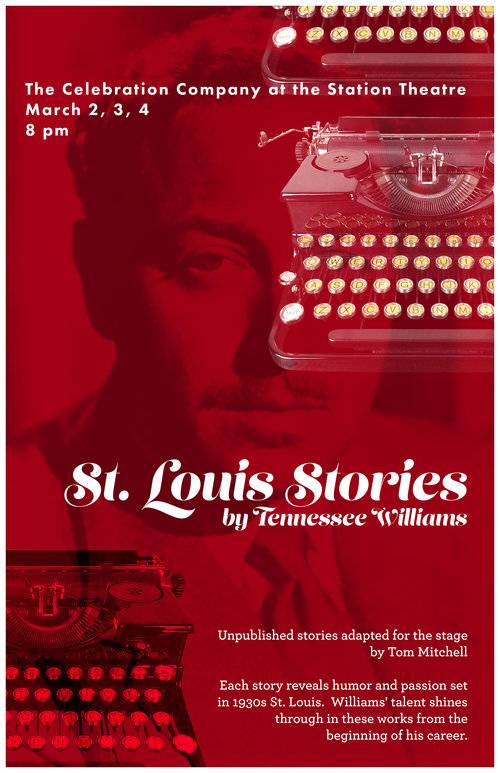Earlier this summer, the season announcement for The Celebration Company’s 45th year held only a few details about the upcoming one-weekend work called St. Louis Stories: it is based on Tennessee Williams’ early-period writing while he lived in St. Louis, none of these works had been published before, and it is being headed by respected local director Tom Mitchell. Previously this season, Mitchell directed The Minotaur at Illinois Theatre, and was lauded by Smile Politely for his production of Not About Nightingales, another Tennessee Williams’ work, in 2015.
 In fact, Mitchell has been taken with Williams – studying his poetry and producing his plays for over fifteen years – and almost always from his early writing years while living in St. Louis. The writer lived in the Gateway City from early childhood through his college years – about 1919 through 1938 with some semesters spent at college in Columbia, MO – and began writing in high school during the mid-twenties. This setting seems to draw Mitchell, who told SP in an earlier interview with Athanasia Gianettos:
In fact, Mitchell has been taken with Williams – studying his poetry and producing his plays for over fifteen years – and almost always from his early writing years while living in St. Louis. The writer lived in the Gateway City from early childhood through his college years – about 1919 through 1938 with some semesters spent at college in Columbia, MO – and began writing in high school during the mid-twenties. This setting seems to draw Mitchell, who told SP in an earlier interview with Athanasia Gianettos:
“…so mostly my connection first starts with the inner life of the characters that are expressed in Williams. The need for escape, the need for realizations in life, for meaning in life that those characters face. And then the midwestern place that Williams was coming from, St. Louis. There was something about that that I also recognized because my own background is in the midwest. Even though Williams is a southern writer, he really was writing from St. Louis, from the heartland, so I recognized that world.”
Knowing this about Mitchell, it makes sense that he would travel to the Ransom Research Center at the University of Texas-Austin to read some of Tennessee Williams’ short stories and poems that have never been published. The director has woven together five of these short stories and a poem or two into an original production that he has been developing, and will premiere at the Station Theatre this weekend.
Hoping to give our readers some more in-depth information about the production, Tom Mitchell was happy to speak with Smile Politely.
Smile Politely: When did you begin work on the adaptation? Are you hoping the production will be published and widely distributed?
 Tom Mitchell: I put this adaptation together about a year ago using materials that I had collected on several trips to Texas to read through materials there. I am interested to see how the performance goes. I am interested in introducing people to this body of Williams’s work.
Tom Mitchell: I put this adaptation together about a year ago using materials that I had collected on several trips to Texas to read through materials there. I am interested to see how the performance goes. I am interested in introducing people to this body of Williams’s work.
We will present them at the Station Theatre March 2, 3, and 4, then take them to New Orleans for the Tennessee Williams/New Orleans Literary Festival on March 23-26, performing at the Le Petite Theatre there. I hope to also present them at a new festival in St. Louis sometime in the next year.
I think there would be value in publishing a collection of the early short stories as it displays aspects of TW’s writing that is less familiar — in particular his experiences and point of view in the 1930s.
SP: Have you woven the five stories together as one longer narrative? Or are they independent, like a set of one-acts?
Mitchell: The pieces are independent but share in their relationship to St. Louis in the 1930s, so they offer a glimpse into a particular world.
I think audiences will enjoy these stories that include portraits of a young office worker who celebrates an afternoon off for his boss’s funeral; a middle aged woman’s lonely call to her doctor in need of his attentions and his touch; two young men (an office worker and a vagrant) who envy one another across the city’s fountain; an clergyman who retires to St. Louis where he can enjoy secret pleasures like the movie theatre, and a young librarian who’s life has been frozen by a sexual assault at summer camp nine years earlier.
SP: Can you tell me about the cast? Since this is an original production, did they have input into the creative process?
Mitchell: The cast is Joi Hoffsommer, J.W. Morissette, Ann Marie Morissette, Kyle A. Thomas, Sara Freedland, and Yvon Streaker. Hannah Schumacher is our Stage Manager.
Rehearsals have been a little crazy because Joi is Theatre Program Director at Parkland and has been supervising the Student Production there. JW just directed Failure: A Love Story in the Krannert Center Studio Theatre with Sara and Yvon in the cast. Kyle A. Thomas is staging Viva Verdi for Lyric Theatre at Krannert’s Tryon Festival Theatre (with Hannah stage managing.) Ann Marie teaches music at Barkstall and with the Central Illinois Children’s Chorus. All in all, scheduling rehearsals has been nuts.
It’s also been a process of testing and exploring because these are adaptations of stories, and have never been presented before. We are trying to find the best way to capture the writer’s intentions, and make use of his beautifully expressive language.
One of my motivations for doing this is to work with this talented group and get their ideas about how to shape the performances of each piece. I think it may continue to develop as we get an audience reaction.
SP: That is quite the roster of local superstars, with a lot of directors included. In general, do you find it easier or harder to direct directors?
Mitchell: Because I know each of the other directors who are acting in this, I feel pretty good about working with them (and I hope they feel likewise.) I am able to invite their ideas for how to approach things, and each of them have contributed lots of improvements on my initial attempts.

SP: I’ve heard debate surrounding Tennessee Williams’ quote: “I found St. Louisians cold, smug, complacent, intolerant, stupid and provincial…I hate the place.” Some scholars have suggested that he really hated the experiences in his child- and young adult-hood rather than the city itself. After spending so long researching his life and work there, what are your thoughts?
Mitchell: I think you are partly right — some of his feeling about the city come from a difficult, dysfunctional household. St. Louis was also a very dirty city — he called it “St. Pollution” — from lots of coal burning industry. And it was the Great Depression when he was of college age.
SP: From my slight research, it seems like the “St. Louis years” of writing would go from 1927-1938 before he left for the University of Iowa. Although human emotions can transcend setting and era, how do you think that time-period’s mindset affects the topics contained in the stories you mentioned? I’m especially thinking of the ones featuring women, which seem like they may have been risqué for the time.
Mitchell: Yes, I think the writing is reflective of the 1930s, but [his] empathy for character transcends time period.
I think there is much difference in how women generally value themselves (especially in relationship to men) from the 1930s to the present. In one of the stories a middle aged woman finds herself feeling “useless”, though a better expression for her condition is to say that she is desperately lonely and in need of a human touch. She seeks out her young doctor who is able to “touch” her in his nighttime house call. Williams’s understanding of how humans need contact is a theme throughout his plays.
In another of the stories, a young woman finds herself contending with a sexual assault that she experienced nine years earlier. Since that time she has not been able to have any meaningful relationship with a man without seeing her attacker in her mind’s eye. Her story, told in a stream of consciousness, reveals her conflicted feelings of “love-hate” for the attacker. Today, one would hope that a woman in her situation would have resources, support, and self-esteem enough to move on, but in the 1930s her situation was probably not so unusual.
—
St. Louis Stories will premiere at the Station Theatre in Urbana on March 2-4, 2017 at 8 p.m. Thursday’s tickets will cost $10 while Friday and Saturday performances are $15. Make your reservation online or by calling the ticket office at 217-384-4000 and leaving a message.








